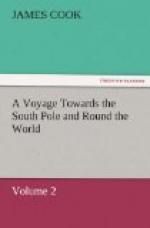Among other of the late improvements of the naval stores we have heard much of the Portable-Soup, and accordingly we find that Captain Cook hath not a little availed himself of it in his voyage. This concentrated broth being freed from all fat, and having by long boiling evaporated the most putrescent parts of the meat, is reduced to the consistence of a glue, which in effect it is, and will, like other glues, in a dry place, keep sound for years together. It hath been said, that broths turn sour on keeping, though made without any vegetable*. Now, whether any real acid can be thus formed or not, I incline at least to believe that the gelatinous parts of animal substances, such as compose these cakes, are not of a nature much disposed to putrefy. But however that may be, since Captain Cook observes, that this soup was the means of making his people eat a greater quantity of greens than they would have done otherwise, in so far we must allow it to have been virtually antiseptic.
[* La feule matiere qui s’aigriffe dans le sang est la matiere gelatincuse, etc. Senac, Structure du Coeur, 1. iii. ch. 4. para. 5.]
So much for those articles that have of late been supplied to all the king’s ships on long voyages, and in which therefore our worthy brother claims no other merit than the prudent dispensation of them; but what follows being regulations either wholly new, or improven hints from some of his experienced friends, we may justly appropriate them to himself.
First then, he put his people at three watches, instead of two, which last is the general practice at sea; that is, he divided the whole crew into three companies, and by putting each company upon the watch by turns, four hours at a time, every man had eight hours free, for four of duty: whereas at watch and watch, the half of the men being on duty at once, with returns of it every four hours, they can have but broken sleep, and when exposed to wet, they have not time to get dry before they lie down. When the service requires it, such hardships must be endured; but when there is no pressing call, ought not a mariner to be refreshed with as much uninterrupted rest as a common day-labourer?
I am well informed, that an officer distinguishes himself in nothing more than in preserving his men from wet and the other injuries of the weather. These were most essential points with this humane commander. In the torrid zone he shaded his people from the scorching sun by an awning over his deck, and in his course under the antarctic circle he had a coat provided for each man, of a substantial woollen stuff, with the addition of a hood for covering their heads. This garb (which the sailors called their Magellan jacket) they occasionally wore, and found it more comfortable for working in rain and snow, and among the broken ice in the high latitudes of the South.




